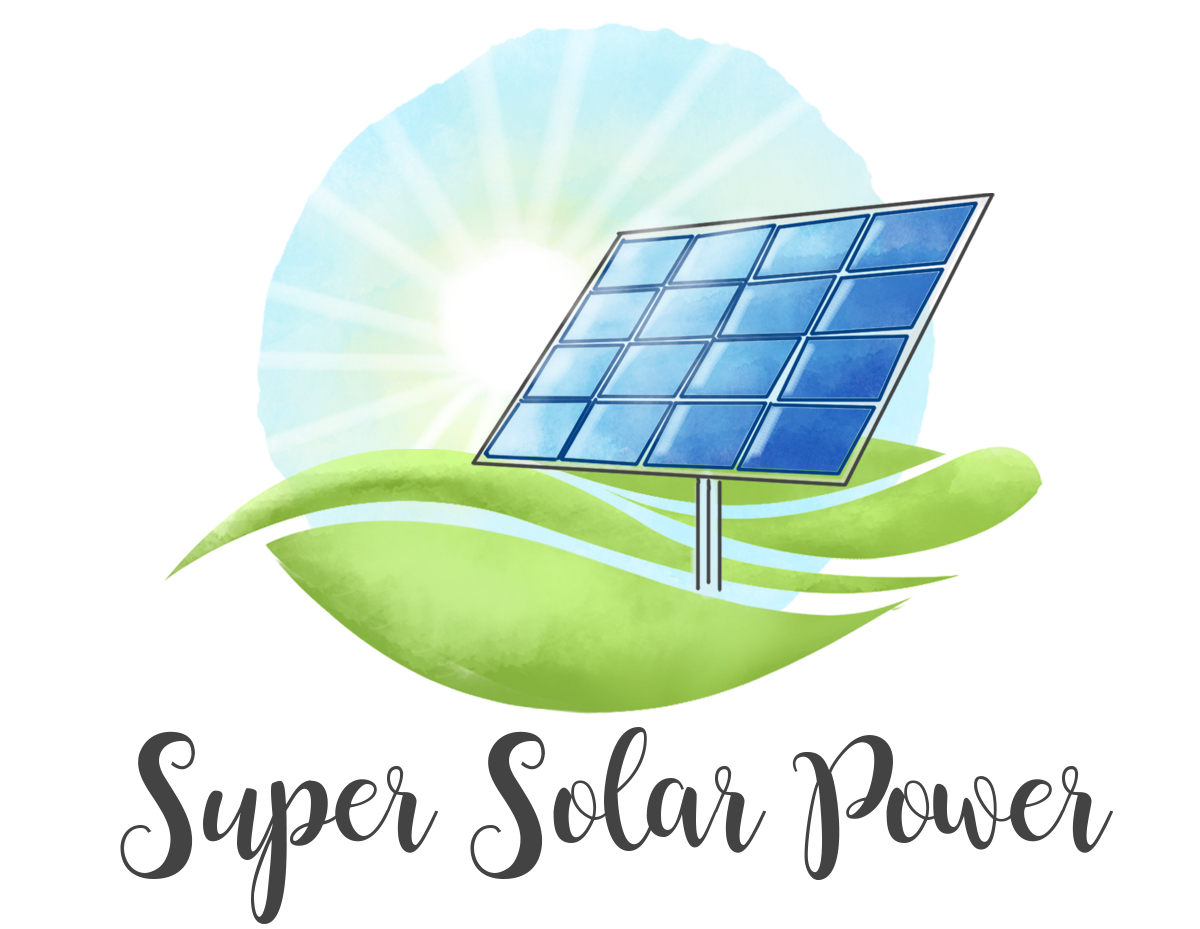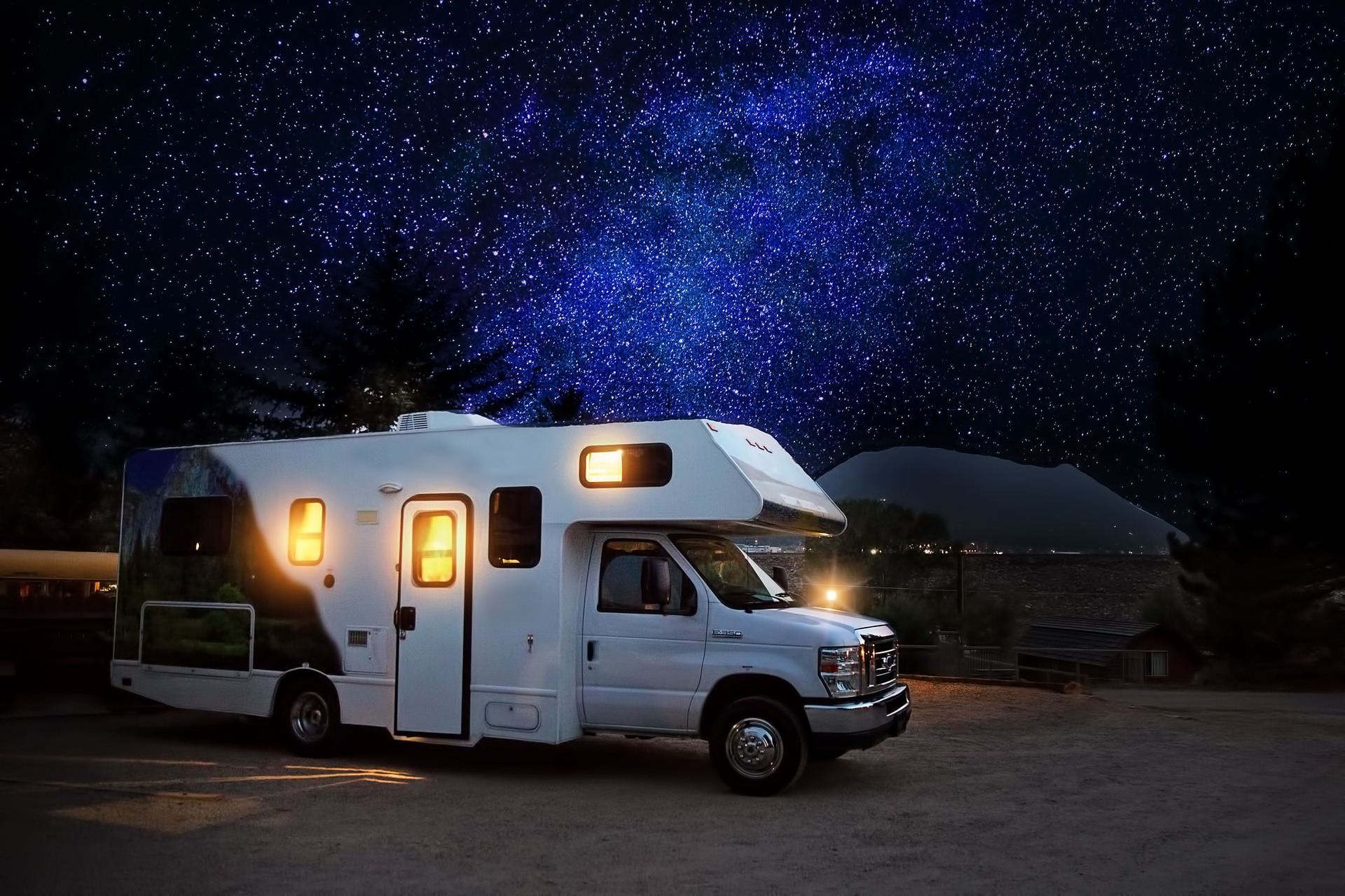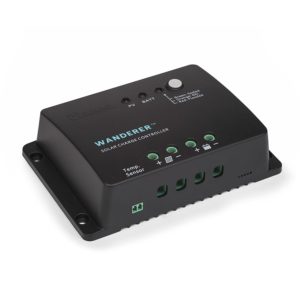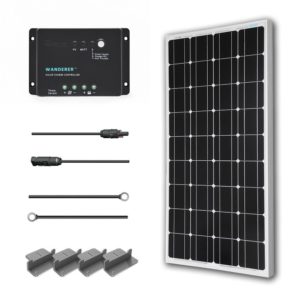RV Solar Panels: An Essential Guide To Getting Started
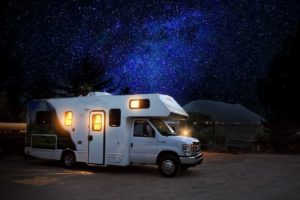
If you’re thinking of getting RV solar panels, you are joining many who have gone before you and have been thrilled at the results.
Who doesn’t like free electricity?
You need power and enough of it to charge or power the appliances and devices you want to use while on the road.
But is there such thing as a perfect RV solar power system?
Well, there are some that are really close (and one I especially like) but what you’ve got to do is figure out what your needs are and find what will match them most closely.
This page is designed to help you do just that.
The Advantages of Solar Power
Solar does have many advantages. (I’ve actually written about the advantages of solar power here.) For those is an RV, caravan or trailer, there is one thing they are much much better than. Generators.
Ever camped next to someone running a noisy, stinky generator? I have. Not pleasant, I have to say.
Compared to generators, solar power is cheap, reliable, quiet and easy to move. It is also better than relying on batteries.
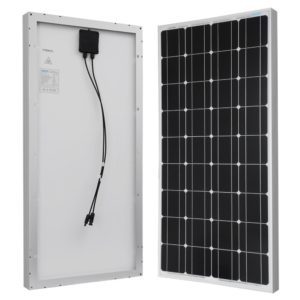 Solar Panels: What Is Best For You?
Solar Panels: What Is Best For You?
Solar panels come in different shapes, sizes and materials. So making your way through this maze can be a little difficult when just starting out.
Here are the main things to take into consideration
Mounted or Portable Solar Panels?
When you’re talking RVs, caravans and other traveling homes, there are two categories solar panels fall into. Mounted and portable.
The main difference between mounted and portable solar panels is that can be moved to follow the sun.
Mounted Solar Panels
Most RVs do end up using mounted solar panels. If you need on-going consistent power (like for a fridge) and require more rather than less power, mounted is better.
Advantages:
- Once installed, you’re done messing with them.
- You can install as many on the roof as you have space for.
- They use space that is not needed for other things.
- Very convenient.
- More secure from theft.
Disadvantages
- You will need to park in full sun. This may require you to have a fan or air conditioning.
- They can’t adjust to achieve maximum production.
Portable Solar Panels
If you will be in a hot climate where you really don’t want to be parked in the sun, don’t need too much power and generally stick close to your RV, portable solar panels may work well for you.
What you need to keep in mind is that you need to set your portable panel up (and plug it in) each time you’d like to use it.
Advantages
- Many portable solar panels are quite easy to set up. Some have fold out legs and you can quickly set them out in the sun.
- Allows you to park in the shade.
- Useful if your electricity needs are on the smaller side.
- Maximize sun exposure.
Disadvantages
- If you need lots of power, you don’t want to go around setting up multiple panels.
- Another task associated with packing and unpacking once you are on site.
- Risk of theft.
- Need to consider where you will store the solar panels when not in use.
The solar power kit that I consider to be the best for RVs gives you the option of mounting or using portable panels. If you’re not sure which is best, you can always start with a portable panel and mount later if desired.
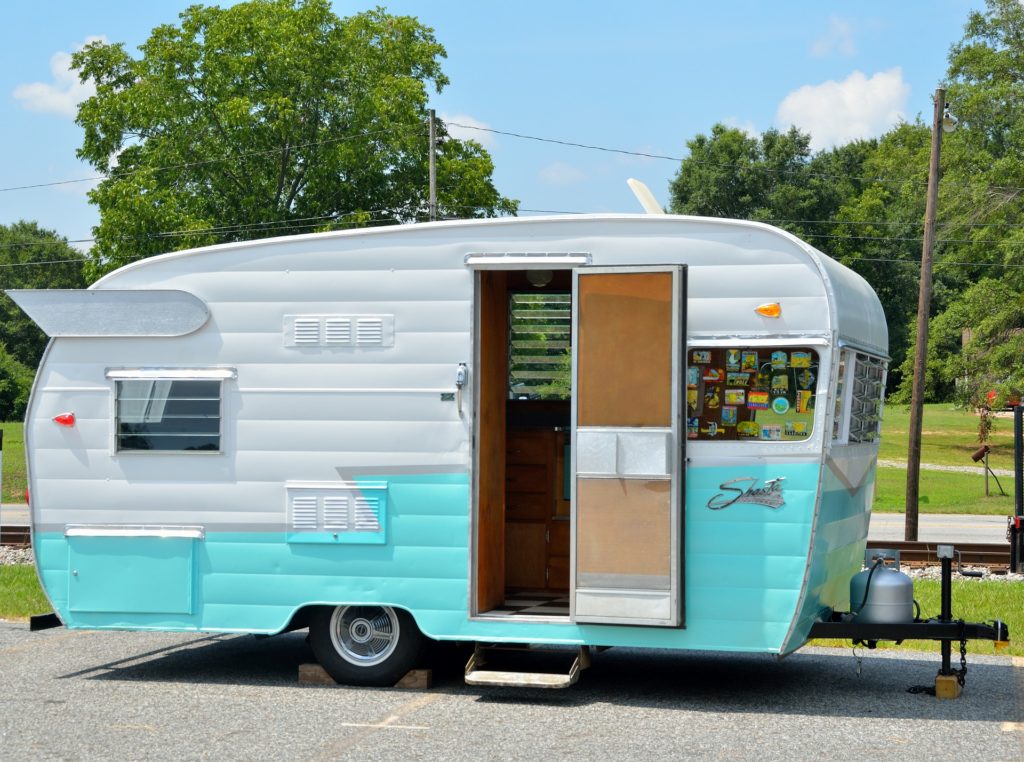
What Should RV Solar Panels Be Made Out Of?
You may have shopped around already and noticed that there is quite a difference in price when it comes to solar panels. This is due to quality and what the solar cells are made from.
Generally, when it comes to RV solar panels, you don’t want to choose the cheapest. These solar panels will be rattled and shaken while being driven around on your rig and quality is important for them to make it past their first years.
Glass Solar Panels
Glass solar panels are generally used for home and commercial solar power installations. They’ve been around the longest and are a solid choice.
For an RV, glass panels would be mounted to the roof using screws or whatever the manufacturer has prepared or recommended.
Flexible Solar Panels
Flexible panels have the benefit of not needing mounting gear to be installed. They can be siliconed directly onto the roof.
They are more expensive and if you wanted flexible panels, be sure they are higher quality. (I’ve seen some wearing out and folks not being too thrilled about that.)
Folding Solar Panels
If you like the idea of portable panels, be aware that you can get some that fold up nice and neat to be stored away easily.
Every RV roof is different and that is important to keep in mind when choosing solar panels. They do come in a variety of shapes and sizes. It’s not one size fits all.
Opt for Monocrystalline Solar Panels
Monocystalline panels are high quality and a very efficient use of space. They will provide you with energy more efficiently than both polycrystalline and thin film solar modules.
They will also last longer.
High quality solar panels will look that way. The size and shape of the cell size matters and the clearer and more orderly they are, the better the quality.
Choosing monocrystalline solar panels will cost slightly more but you’ll make it up over the long term.
This is why the solar power kit I recommend has monocystalline solar panels. They’re the best.
What About Bad Weather?
Be sure your solar panels have been tested for bad weather and can handle wind, rain and snow (if applicable). Most solar panels will state the extent to which they can handle wind and snow loads.
When weather is cloudy or rainy (especially for days on end) you may not be able to generate much power.
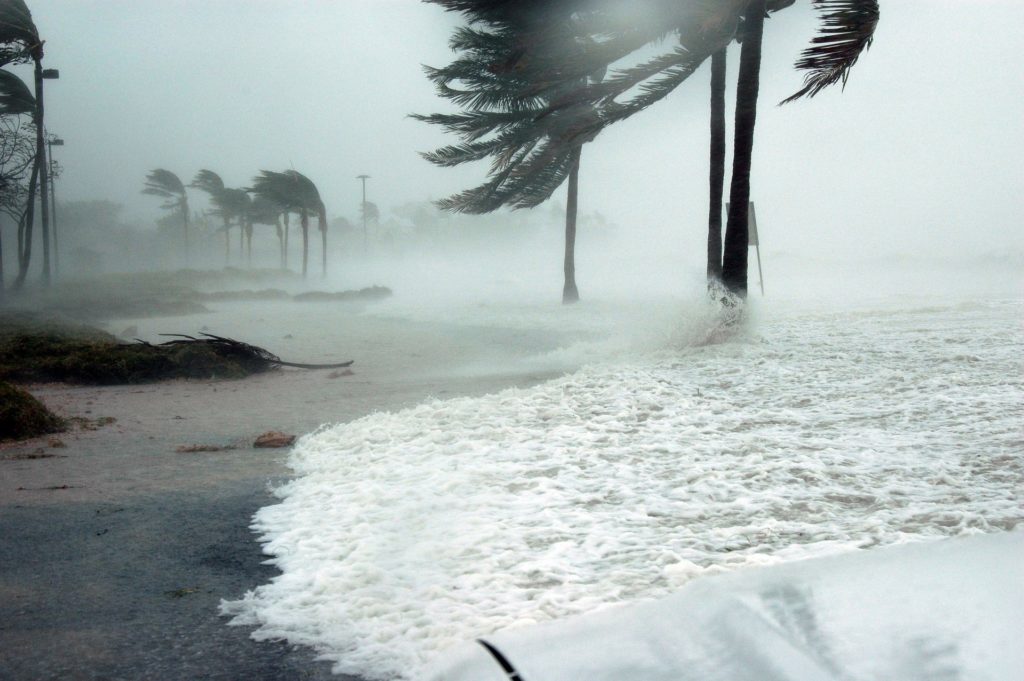
It’s good to have a back-up plan.
Being prepared for a lack of energy in terms of battery storage is a good idea. Having a bit of extra powered stored up can be great but you may want something else as well.
An example of a back up power supply is a dual battery system with a DC charger. This is the battery your vehicle uses plus a second battery. (I will talk more about batteries further on.)
Just How Much Power Will You Need?
When choosing your solar panels and set up, it’s essential to figure out your energy needs.
Things to keep in mind:
- How long will you be traveling? The longer you’re away, the larger the system you may want to have.
- What time of year will you be traveling and how much sunlight will be available at that time?
How to Figure Out How Much Power You Need:
- Make a list of the appliances, devices and gadgets you need power for.
- Roughly estimate the running or charging times needed, over one day, for each appliance or device.
- Multiply the wattage of each appliance or device by its running time.
- Add together the watt hours for each appliance and device (from step 3). This is your total daily power consumption estimate.
- Convert watt hours to amp hours.
- Amp hours will tell you what size battery you need.
- (Optional but recommended) Add another 50% on top of your wattage and amp numbers. Many do this to cover themselves when their batteries aren’t able to be charged.
What You Need To Know About Batteries
Batteries are needed to store the energy you collect from the sun through your solar panels.
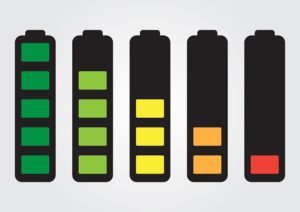
Batteries for An RV Solar Panel System:
- Need to be large
- Need to be sturdy
- Designed for solar power (so they’re not bothered by interrupted power)
- Don’t need much maintenance
- Should have high cyclic life
- Many go for AGM deep cycle batteries
This is a good battery guide for RVs.
You will need a regulator or controller when connecting solar panels to batteries. You don’t want your deep cycle batteries to overcharge and get damaged from the solar panels providing more energy than the batteries can take. Many solar panels generate more than 12V – especially in ideal conditions.
Cost of Batteries:
Generally, batteries will at least double the cost of a solar power kit. Most do not include batteries.
There is a large range in terms of variety, cost and efficiency.
What a Basic RV Solar Power System Looks Like
The RV solar power system is made up of:
- Solar Panels (gathers electricity).
- A Solar Regulator or Controller. This regulates the current passed into the regulator from the panels before leaving. Appliances can use electricity directly from the regulator but best practice is to use a battery.
- Battery. Generally, your devices, gadgets and appliances use the electricity from batteries and are connected to them.
What is the Regulator?
We haven’t yet mentioned the regulator but it is a critical piece of the puzzle.
The solar regulator has three main functions:
- Controls voltage
- Regulates the direction of the current
- Prevents overcharging
As a single solar panel can generate up to 19V at times, the regulator will adjust the volume of the voltage into something that suits the battery.
Important:
In your RV solar power system, you can have more than one solar panel and more than one battery. All are connected to the regulator.
One of the great things about solar power systems is that they are easy to expand. You can always add more batteries and more solar panels – as long as there is room on your roof!
Quick Notes on Solar Panel Connectors and Wiring for RVs
Some solar power kits, like this one, come with MC4 connectors. These are great as they allow to easy waterproof wiring.
When expanding your solar power kit to use more than one solar panel, you can use adapters that allow you to join to cables to one. This really makes it easy to add on panels but use just one set of wire.
Be sure to check out which thickness or gauge your RV wire is compared to a solar panel kit or system. Often when you read reviews (like on Amazon), people will have asked questions about or mentioned the gauge of the wire. They are a great resource.
Warranty Considerations:
Make sure a warranty is offered and read the reviews for a solar panel kit you are considering. If the warranty is quite short, consider another brand.
Very important for RVers:
Make sure your warranty doesn’t exclude you. Some warranties don’t cover RV and mobile uses.
Final Wrap-Up
RV solar panels need to be efficient and durable. When deciding what is right for you, keep your goal in mind – just what do you need to power.
Initial cost is not everything. When it comes to solar panels, it is worth paying a little bit more for quality. You’ll make it up over time.
All that’s left is to decide what is right for you.
==> Be sure to check out Renogy’s Monocrystalline Solar Starter Kit (100 Watt 12 Volt )
